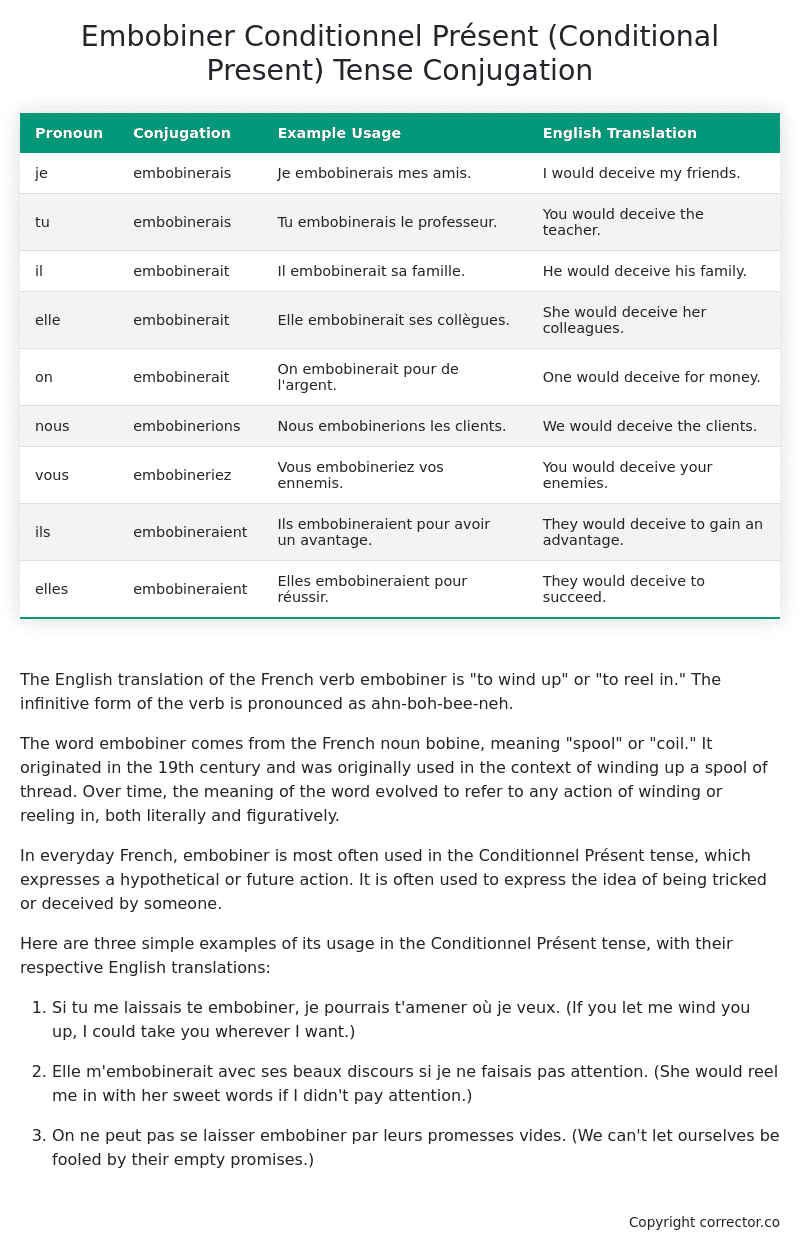Conditionnel Présent (Conditional Present) Tense Conjugation of the French Verb embobiner
Introduction to the verb embobiner
The English translation of the French verb embobiner is “to wind up” or “to reel in.” The infinitive form of the verb is pronounced as ahn-boh-bee-neh.
The word embobiner comes from the French noun bobine, meaning “spool” or “coil.” It originated in the 19th century and was originally used in the context of winding up a spool of thread. Over time, the meaning of the word evolved to refer to any action of winding or reeling in, both literally and figuratively.
In everyday French, embobiner is most often used in the Conditionnel Présent tense, which expresses a hypothetical or future action. It is often used to express the idea of being tricked or deceived by someone.
Here are three simple examples of its usage in the Conditionnel Présent tense, with their respective English translations:
-
Si tu me laissais te embobiner, je pourrais t’amener où je veux. (If you let me wind you up, I could take you wherever I want.)
-
Elle m’embobinerait avec ses beaux discours si je ne faisais pas attention. (She would reel me in with her sweet words if I didn’t pay attention.)
-
On ne peut pas se laisser embobiner par leurs promesses vides. (We can’t let ourselves be fooled by their empty promises.)
Table of the Conditionnel Présent (Conditional Present) Tense Conjugation of embobiner
| Pronoun | Conjugation | Example Usage | English Translation |
|---|---|---|---|
| je | embobinerais | Je embobinerais mes amis. | I would deceive my friends. |
| tu | embobinerais | Tu embobinerais le professeur. | You would deceive the teacher. |
| il | embobinerait | Il embobinerait sa famille. | He would deceive his family. |
| elle | embobinerait | Elle embobinerait ses collègues. | She would deceive her colleagues. |
| on | embobinerait | On embobinerait pour de l’argent. | One would deceive for money. |
| nous | embobinerions | Nous embobinerions les clients. | We would deceive the clients. |
| vous | embobineriez | Vous embobineriez vos ennemis. | You would deceive your enemies. |
| ils | embobineraient | Ils embobineraient pour avoir un avantage. | They would deceive to gain an advantage. |
| elles | embobineraient | Elles embobineraient pour réussir. | They would deceive to succeed. |
Other Conjugations for Embobiner.
Le Present (Present Tense) Conjugation of the French Verb embobiner
Imparfait (Imperfect) Tense Conjugation of the French Verb embobiner
Passé Simple (Simple Past) Tense Conjugation of the French Verb embobiner
Passé Composé (Present Perfect) Tense Conjugation of the French Verb embobiner
Futur Simple (Simple Future) Tense Conjugation of the French Verb embobiner
Futur Proche (Near Future) Tense Conjugation of the French Verb embobiner
Plus-que-parfait (Pluperfect) Tense Conjugation of the French Verb embobiner
Passé Antérieur (Past Anterior) Tense Conjugation of the French Verb embobiner
Futur Antérieur (Future Anterior) Tense Conjugation of the French Verb embobiner
Subjonctif Présent (Subjunctive Present) Tense Conjugation of the French Verb embobiner
Subjonctif Passé (Subjunctive Past) Tense Conjugation of the French Verb embobiner
Subjonctif Imparfait (Subjunctive Imperfect) Tense Conjugation of the French Verb embobiner
Subjonctif Plus-que-parfait (Subjunctive Pluperfect) Tense Conjugation of the French Verb embobiner
Conditionnel Présent (Conditional Present) Tense Conjugation of the French Verb embobiner (this article)
Conditionnel Passé (Conditional Past) Tense Conjugation of the French Verb embobiner
L’impératif Présent (Imperative Present) Tense Conjugation of the French Verb embobiner
L’infinitif Présent (Infinitive Present) Tense Conjugation of the French Verb embobiner
Struggling with French verbs or the language in general? Why not use our free French Grammar Checker – no registration required!
Get a FREE Download Study Sheet of this Conjugation 🔥
Simply right click the image below, click “save image” and get your free reference for the embobiner Conditionnel Présent tense conjugation!

Embobiner – About the French Conditionnel Présent (Conditional Present) Tense
Formation
Common Everyday Usage Patterns
Expressing Polite Requests
Expressing Hypothetical Situations
Expressing Doubt or Uncertainty
Interactions with Other Tenses
Present Tense
Past Tense
Future Tense
Conditional Perfect
Summary
Want More?
I hope you enjoyed this article on the verb embobiner. Still in a learning mood? Check out another TOTALLY random French verb conjugation!


